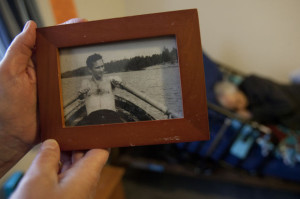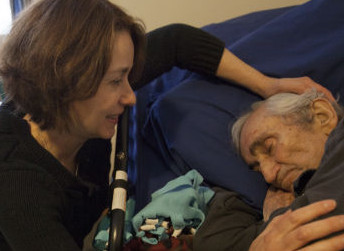
When Arkady Grinblat would try to go outside of his assisted-living facility, an alarm would go off.
Staff told him he couldn’t walk into other people’s rooms. Workers who seemed like strangers came to change his clothes.
The situations led Grinblat, 90, who has Alzheimer’s disease, to yell, push or hit. Like other people with behavior problems related to dementia, he risked being sent to Mendota Mental Health Institute.
But Dane County’s Dementia Support Team arranged for Grinblat to move to a smaller assisted-living facility instead, paying to hire an extra caregiver and put up a fence so Grinblat could get fresh air.
The team has “rescued” 32 dementia patients from Mendota, returning them to community settings and saving taxpayers money, county officials say. Mendota, designed for people with psychiatric conditions, is too loud, restrictive and institutional for people with dementia to stay there long term, officials say, and it costs about $1,000 a day.
“It’s a public responsibility to create a plan that’s safe for them, safe for the community and cost effective,” said Fran Genter, Dane County’s administrator of adult community services.
The Dementia Support Team, formed in 2009 after a dementia patient from the county lingered at Mendota for more than two years, could expand through a state effort to reform dementia services.
The state Department of Health Services in February released a plan to redesign dementia care. The plan responds to a growing need for dementia care as the population ages and a state Supreme Court ruling in 2012 that said people with Alzheimer’s can’t be involuntarily detained under a mental health statute.
As part of the overhaul, the state health department is talking with the Madison-based Alzheimer’s and Dementia Alliance of Wisconsin, part of the county’s Dementia Support Team, about expanding the team’s model to other parts of the state.
The goal is to respond to dementia patients’ behavior problems soon after they arise, “before they escalate to the level of being a crisis,” said Kristen Felten, a dementia specialist with the state health department.
The accommodations for Grinblat at Fountainhead Homes’ Raymond House in DeForest, where he has been living since September, have greatly improved his quality of life, said his daughter, Jenya Grinblat, of Madison.
“This place is a little bit of heaven,” she said.
A lack of infrastructure
The state plan looks at hiring more social workers to help families find Alzheimer’s services, certifying caregivers trained in dementia care and expanding centers that accept emergency placements, among other developments.
“The real problem is that we do not have the infrastructure in place for the care of dementia patients that would avoid many of these crises,” said Kitty Rhoades, state health department secretary.
Wisconsin has about 100,000 people with Alzheimer’s disease ages 65 and older, according to the Alzheimer’s Association. It is expected to have 130,000 such residents by 2025.
About 12,000 people with Alzheimer’s or dementia live in nursing homes, with an additional 18,000 in assisted-living facilities, the state health department says.
It’s not clear how often such people have behavior problems leading to placement in mental health units. But the process is changing after the 2012 Supreme Court decision involving an 85-year-old Fond du Lac woman with Alzheimer’s, identified only as Helen E.F.
After exhibiting aggressive behavior in a nursing home, she was involuntarily committed under a mental health statute to a locked psychiatric unit for months.
The court said she couldn’t be detained under the statute because her condition was permanent and untreatable. She could be detained under another statute for protective services in other kinds of facilities.
A Legislative Council committee introduced a bill last year to make legal changes in response to the ruling, but the bill didn’t get a hearing in the Legislature. The state health department said it wanted to try systemic changes first.
“We asked for a timeout to let us redesign the infrastructure,” Rhoades said. “If we need statutory changes, we’ll identify them.”
Cost-effective care
The Dementia Support Team includes staff from the Alzheimer’s and Dementia Alliance of Wisconsin and the South Madison Coalition of the Elderly, along with Dr. Kim Petersen, a Madison-area specialist in geriatric medicine.
When dementia patients supported by Dane County programs are placed at Mendota or have escalating behaviors in community settings, the team is notified. Team members adjust medications if appropriate and interview family members and caregivers to identify what might be triggering the problems.
Details that emerge lead to recommendations for suitable facilities or changes in care plans, said Jeanne McLellan, an alliance administrator and team member.
One man kept throwing his lunch tray until the team discovered he never liked milk, McLellan said. A Korean War vet reacted to planes flying over his room until he was moved to another part of the building, she said.
Another man, told he had to be in bed by 9 p.m., had worked as a night watchman and wanted to roam after dark. For another man who liked to be in motion, the team arranged to replace carpeting, take out part of a wall and create a protective PVC cage around his seat-equipped walker to let him move around.
“You’ve got to figure out the personal history and adapt,” said Rob Gundermann, public policy director of the alliance.
Care for dementia patients in community settings costs about $400 a day, compared to $1,000 a day at Mendota, said Genter, the county administrator.
That means taxpayers save about $18,000 for each month a patient stays out of Mendota, making investments in carpeting, fences and other accommodations cost effective, he said.
Finding the right setting
Arkady Grinblat, a mechanical engineer from Russia, emigrated to the U.S. with his wife and two daughters in 1981, settling in Dayton, Ohio.
When Jenya Grinblat got a job in 2001 at UW-Madison, where she is an associate professor of neuroscience and zoology, her parents moved to Madison. Her mother died in 2003.
A few years later, Arkady started forgetting names and places. His driving became erratic. He could no longer manage his money.
He was diagnosed with dementia — almost certainly Alzheimer’s, doctors said. He moved in with Jenya, her husband and their three children.
About five years later, he started needing more supervision and moved into an assisted-living facility.
Restrictions at the facility made him combative, jeopardizing the safety of others and causing authorities to consider a placement at Mendota, said David Moskoff, Grinblat’s case manager at South Madison Coalition for the Elderly.
The Dementia Support Team recommended moving him to the eight-room Raymond House in DeForest. The county approved $6,000 to erect a fence and $3,660 a month for a second caregiver at night, said Ruth Polacek, administrator of the facility.
Grinblat’s Alzheimer’s still causes him to act up, his daughter said. “He’s not the easiest person with dementia to deal with,” she said. But he has more freedom to go outside, explore the hallways and get his favorite food — bananas — when he wants.
“They know him here,” Jenya Grinblat said. “He’s not just dementia to them. He’s a person.”
[Editor’s note: This story has been updated to correct the spelling of Kristen Felten’s last name.]

